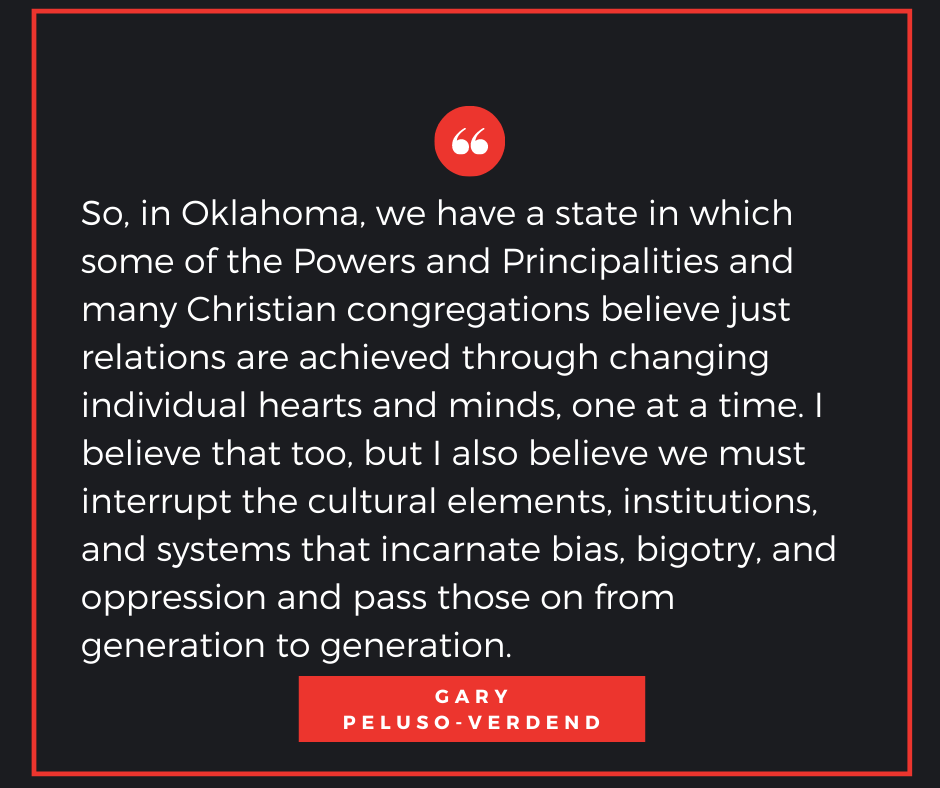When Disruption is Gospel
It feels odd to work for an organization considered by some of the Powers and Principalities to be an enemy of sound education and good order.
For the next few months, in addition to my Phillips work, I am serving as the interim CEO and president of the Oklahoma Center for Community and Justice. (I’ve been a board member for a decade and am personally dedicated to its mission, a mission that is congruent with my Christian faith commitments).
 OCCJ is the descendant of the Tulsa and Oklahoma City affiliates of the National Conference of Christians and Jews. The NCCJ was a “brotherhood” organization that brought religious and civic leaders together for “fellowship” at a time when crossing religious boundaries to work on the common good was rare. The NCCJ was especially active in the civil rights movement of the 1950s and 1960s. In most cities, whether in the South or the North, NCCJ work was considered somewhat edgy. When have racial justice efforts been anything but edgy and controversial? They certainly have been in Oklahoma.
OCCJ is the descendant of the Tulsa and Oklahoma City affiliates of the National Conference of Christians and Jews. The NCCJ was a “brotherhood” organization that brought religious and civic leaders together for “fellowship” at a time when crossing religious boundaries to work on the common good was rare. The NCCJ was especially active in the civil rights movement of the 1950s and 1960s. In most cities, whether in the South or the North, NCCJ work was considered somewhat edgy. When have racial justice efforts been anything but edgy and controversial? They certainly have been in Oklahoma.
Today, the mission and vision of OCCJ is this: “OCCJ is dedicated to inspiring and equipping Oklahomans to overcome bias, bigotry, and oppression. We envision a state that is inclusive, just, and hospitable for all.”
Well, today is not 1964 or 65. The Civil Rights and Voting Rights Acts would be DOA in the Senate and in many states today. In those places, the Powers and Principalities are vigilant to stop teaching anything that allegedly makes students uncomfortable regarding their various identify groups—discomfort with “everything is okay as it was in the 1950s” not included.
The OCCJ mission and vision are a critique of The Way Things Are. Our work assumes bias, bigotry, and oppression are embedded in both individual attitudes and in systemic structures. A state that is inclusive, just, and hospitable for all requires changed individuals and changed structures.
We must reckon with Oklahoma’s histories on race, religion, land stewardship, and the like. Such efforts discomfort.
I am proud of the great work the OCCJ staff does in offering programs such as Anytown and a forum on race for high school students, as well as an inclusive leadership institute for professionals.
For the high school programs, just a few years ago, recruiting through high schools was an effective strategy. That is no longer the case, for the Powers and Principalities are labeling and slurring such efforts as racial reckoning as un-American, socialist, wokeness.
Many corporations support OCCJ. Why? Because they cannot afford the wasted time, money, and people fighting against the nation and workplace that both already is and that is evolving. Some of the biggest, most influential corporations in Oklahoma want the diversity, equity, and inclusion work OCCJ does because they want workplaces where diverse people understand each other, can communicate across cultures, judge they are treated fairly, and know how to welcome and onboard new employees. Oh, and they want the state’s culture to be an hospitable place for their employees to having fulfilling personal lives and to raise families in safe, education-affirming spaces.
One would also think these are the goals of religious organizations. Indeed, the Jewish congregations and a few progressive Christian congregations work hard, with OCCJ and on their own, to increase their capacities to work effectively with diverse peoples. But there are also Christian congregations in which their theologies recognize “sin” (for, in Christian terms, bias, bigotry and oppression are sins) as only individual. In that perspective, systemic sin is a liberal invention and has affinities with wealth and income redistribution strategies such as communism. (There are also congregations of different faiths doing their own diversity work regarding race and ethnicity but which do not share OCCJ’s equality commitments regarding women and queer persons.)
I’m not mocking. Just disagreeing.
So, in Oklahoma, we have a state in which some of the Powers and Principalities and many Christian congregations believe just relations are achieved through changing individual hearts and minds, one at a time. I believe that too, but I also believe we must interrupt the cultural elements, institutions, and systems that incarnate bias, bigotry, and oppression and pass those on from generation to generation.
For me, that interruption of the individual and systemic elements ailing persons and society sounds like how the gospel should play out in society.
Dr. Gary Peluso-Verdend is president emeritus at Phillips Theological Seminary and is the executive director of the seminary’s Center for Religion in Public Life. The opinions expressed in this blog are those of the author. Learn more about the Center’s work here and about Gary here.


Comments are closed.